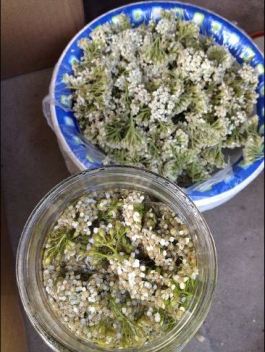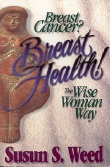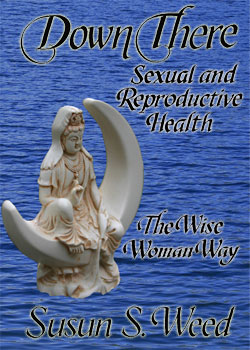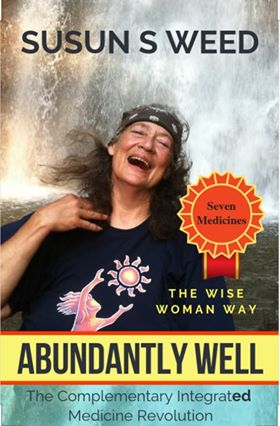
In your herbal pharmacy you transform fresh and dried plants into herbal medicines. Learning to identify and use the common plants around you is easy and exciting, beneficial and safe. Making your own medicines saves you money if you follow the Wise Woman tradition of using local herbs, free for the taking.
Even one day's work in field, forest, and kitchen can provide you with many years' worth of medicines. When you make your own, you know for sure what's in it, where it came from, when and how it was harvested, and how fresh and potent it is.
Dried herbs are best for the infusions recommended in this book. Stock your herbal pharmacy with your own foraged or cultivated dried herbs; expand your resources and experiment with new herbs by buying dried herbs from reputable sources.
Fresh herbs are best for the tinctures and oils recommended in this book. If you can't make your own, buy from sources who wildcraft or grow their own herbs to use fresh in preparations.
Whether you buy or make your own medicines, remember, herbal remedies may not work or may work incorrectly if they aren't prepared correctly. Read this chapter carefully; it contains easy to follow instructions for every remedy and preparation mentioned in this book [Wise Woman Herbal for the Childbearing Year].
Spirit Bases
Herbs prepared in vodka, brandy, or other liquors, or vinegar, are called tinctures.
Tinctures can be used internally or externally.
Herbs prepared in rubbing alcohol are called liniments.
Liniments are for external use only.
Tinctures
Tinctures are a popular way of using medicinal herbs. They have the following advantages over water-based preparations:
Tinctures remain potent for many years.
Small quantities of tinctures are effective, sometimes as little as one drop, making them more portable and potable.
Tinctures act very rapidly, especially when administered under the tongue.
Certain herbal alkaloids and resins are extractable only into alcohol. not water.
A very small amount of plant material produces a tincture consisting of many medicinal doses.
Nourishing factors found in herbs, such as vitamins and minerals,are extracted into tinctures, but, since only small amounts of tinctures are taken, only small amounts of these nutrients are ingested. The Wise Woman tradition focuses on the excellent nourishment available in wild foods and herbs to support the body's ability to repair and heal itself. Thus, water-based preparations are usually my first choice as herbal medicines, but I use tinctures when I travel, when I need immediate medicinal effect, or when I am dealing with rare, horrible tasting, or expensive plants.
People who refrain from using all alcohol can still take tinctures. Since alcohol-based tincture doses are small (20 drops is the average dose) and diluted in water, the taste and effect of the alcohol is virtually non-existent. Many alcoholics indicate that herbal tinctures react like medicines in their bodies, not like alcohol. To further mitigate the effect of the alcohol, let it evaporate somewhat by adding the tincture to some water and letting it sit exposed to the air for a few hours.
Dosage: Tincture dosage is widely variable. Experiment with caution and consult references.
Making a Tincture From Fresh Plant Material
The best tinctures are made from fresh plants. These tinctures are so far superior to commercial tinctures made from dried plants that they almost appear to be different medicines!
Tincturing is amazingly simple:
Identify and pick the plant parts you desire to tincture.
Look through the plant material and discard any damaged parts.
Do not wash any part of the plant except roots, and those only when necessary.
Chop the plant material coarsely, except flowers and delicate plants.
Fill a jar to the top with the chopped plant material.
Then fill the jar to the top with 100 proof vodka, vinegar, or the spirit of your choice. (Yes, you can fill a jar to the top twice!)
Cap the jar tightly.
Label the jar with the name of the plant, the part of the plant used, the type of the spirit used, and the date. Example: Shepherd's Purse, the whole plant in flower, 100 proof vodka, 12 May 1985.
Top up the liquid level the next day. (The plant fairies come by and take a little taste of each new tincture.)
Allow plant and alcohol to mingle together for six weeks or more.
Decant the tincture and it is ready to use.
Making a Tincture From Dried Plant Material
Most dried plants are unsuitable for tincturing, with the exception of dried roots, resins, barks, and leathery leaves such as Rosemary, Uva Ursi, and Wintergreen. Powdered herbs are never suitable for tincturing.
The procedure is similar to making a tincture from fresh plants:
Put two ounces of dried root or bark in a pint jar.
Add ten fluid ounces of 100 proof vodka or other spirit.
Cap well and label (plant, part, type of spirit, date.)
Watch the alcohol level closely for the first week and top it up as necessary. (Those fairies get very thirsty.)
Decant the tincture after six or more weeks.
Making a Vinegar Tincture
Vinegar tinctures are not very potent, don't last for as long as alcohol tinctures, and have an aggravating tendency to rust the lid onto the tincture bottle. A few medicinal herbs, such as Lobelia and Wintergreen, are commonly tinctured in vinegar. Many garden herbs, such as Tarragon, Oregano, Chives, and Rosemary, are put up in vinegar.
If you make full strength tinctures with these seasoning herbs, instead of the weak brews you've probably been making, you'll be thrilled with the marinades and salad dressings you'll be able to create.
Follow the above tincture instructions for fresh and dried plants, with these changes:
Fill your jar to the top with room temperature, not boiling, vinegar.
Use apple cider vinegar, wine vinegar (or wine), rice vinegar, etc., but no white vinegar.
Use cork or plastic to cap all your vinegar tinctures. A piece of waxed paper or plastic wrap between the jar and the metal lid is acceptable.
The usual dose of a medicinal vinegar tincture is one teaspoon per hundred pounds of body weight.
In cooking, use your vinegar tincture just as you would regular vinegar. Heavenly!
Tips for Making All Tinctures
Choose a jar that will be filled to the top by the plant material and the alcohol; if an empty "head space" is left, some of the plant material oxidizes and spoilage is more likely.
For extra potency, put up tinctures when the moon is dark or new; decant them when the moon is full. This helps oils, too.
Keep your tincture in a place where you can watch the interesting changes in color, and occasionally poke your finger in to get a taste. There is no need to shake it daily or keep it in isolation or the dark. Avoid strong direct sunlight, though. Occasionally tinctures will ooze; protect your furniture.
Although the tincture is ready to use in six weeks (that's one reason why you label it with the date—so you know when it is ready). there is no need to decant it then. I have kept some herbs sitting in their vodka for years with no problems or decrease of potency.
To decant the tincture, just pour off the alcohol, put it into a brown glass bottle, and cap tightly. You will notice that the plant material is still wet. Put small handfuls of it in a cotton cloth and wring, hard! (This also builds good muscles in the hands.) Add this extra tincture to your bottle.
If your tincture is made from dried roots, much of it remains in the roots after decanting, because dried plant material absorbs alcohol. There are various ways to retrieve that extra tincture. The easiest way is to put the plant material through a centrifugal juicer (minus the cutting blade) such as Acme or Braun. If you don't have access to a juicer, you can use a salad spinner. Wringing is also possible.
Label the bottle of decanted tincture with the same information you put on the original tincture.
When you're ready to use the tincture, put some of the decanted tincture in a small glass bottle with a dropper top. Please use only glass droppers, as residues from plastic droppers will interfere with the medicinal actions of the herbs (and your continued good health). Label the dropper bottle clearly and keep it in a safe place. Buy dropper bottles at your local pharmacy or by mail. (See References and Resources.)
It is advisable to respect the potency of herbal tinctures; although it is unlikely that ingestion of even entire ounce bottleful could kill someone, the likelihood of unsettling effects from such a large dose is great.
Choosing Your Spirit
I prepare nearly all of my tinctures in 100 proof vodka. Other herbalist friends wouldn't think of making a tincture in anything other than brandy. Pharmacists and homeopaths make their tinctures in pure grain alcohol (198 proof).
I suggest 100 proof vodka because it is readily available and fairly inexpensive, clear, and exactly half water and half alcohol. Most books which give recommendations on dosages of tinctures assume that the tincture your are using is a 50% tincture, that is half water and half alcohol. Preparing a tincture in 100 proof vodka eliminates the need to do fancy math to determine the correct dose.
Summary of Tincture Proportions
* Tincture one ounce fresh plant material in approximately one ounce spirit for six weeks.
* Tincture one ounce dried plant material in five ounces spirit for 6 weeks.
Green Blessings.
Susun Weed









